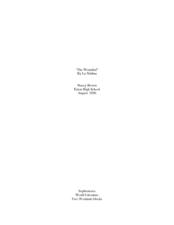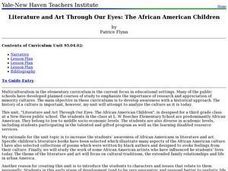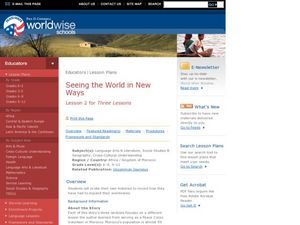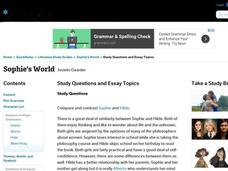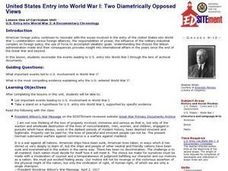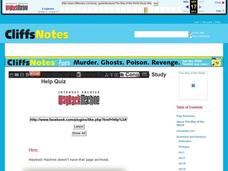Curated OER
World Literature: “The Wounded” By Lu Xinhua
“The Wounded,” the title story from a collection of stories about the Chinese Cultural Revolution (1977-78), is the central text in a World Literature unit examining choices. An anticipation guide, discussion topics, vocabulary list,...
Curated OER
World Creation Myths
After reading creation myths from around the world, use this quiz to test your learners. Five different myths are covered in a multiple-choice format. Increase your scholars' global awareness by studying world literature and cultural myths.
Curated OER
Literature and Art Through Our Eyes: African-American Artists
Examine the contributions of African-Americans in the worlds of art and literature. Over the course of a few days, young scholars will read and analyze a poem, a short story, and a piece of art. They complete a range of...
Curated OER
The Grimm Truth—Comparing & Contrasting Children’s Stories and Fairy Tales in Cross-Cultural Texts at Different Points in Time
Students explore world literature through completing several varied exercises. In this compare and contrast lesson plan students compare and contrast stories and how time and culture impacts the stories.
Curated OER
Women and Korean Literature
Students read a text about women in Korean and their role in Korean literature. In this Korean literature instructional activity, students read a text by Helen Koh to learn about women writers in Korea.
Curated OER
A Month of Mapping Literature
Explore the world through literature! With push pins to mark where each story came from, learners examine cultural differences, geographical location, and how those elements affect story content. This lesson could use deeper development,...
Maryland Department of Education
The Concept of Diversity in World Literature Lesson 13: Unit Culmination - Symposium
To conclude a unit on the concept of diversity in world literature, class members conduct a symposium on "African Literature in Global Perspectives." In order to earn a spot on the panel, individuals craft an original thesis that...
Maryland Department of Education
The Concept of Diversity in World Literature Lesson 1: Unit Introduction
To launch a unit study of the concept of diversity in World Literature, class members compare Chinua Achebe's essay, "An Image of Africa: Racism in Conrad's Heart of Darkness" and Richard Rodriguez's essay, "The Chinese in All of Us: A...
Curated OER
Myths, Folktales, & Fairy Tales
Introduce the concept of myths to your class. Using the link to "Myths Around the World," read a story aloud and have learners list characteristics of a myth. Readers then choose their own myths from the site and work in groups to answer...
Curated OER
Coming of Age During Japanese Occupation: Richard E. Kim's Lost Names: Scenes from a Korean Boyhood
Explore the implications of the Japanese occupation of Korea during World War II. Learners read Lost Names: Scenes from a Korean Boyhood, participate in classroom discussions about the novel and keep journals in which they respond to...
Curated OER
Seeing the World in New Ways
Students examine their own history to expand how they examine the world. They research being a Peace Corps volunteer in Morocco. They also examine Muslim culture.
Spark Notes
Sophie's World by Jostein Gaarder: Study Guide - Mini Essays
Jump online (to Sparknotes), and check out the study questions listed for Jostein Gaarder's Sophie's World. Provide a list of the questions to your high schoolers, and get them in groups to discuss their answers. Potential answers are...
Curated OER
United States Entry into World War I: Two Diametrically Opposed Views
Students analyze the events leading to U.S. entry into World War I. They read a speech by President Wilson and an opposition speech, list the reasons each gives for American entry into the war, and complete a Venn diagram.
Curated OER
A World of Myths
Students read and write myths. In this world mythology lesson, students read and analyze myths from various cultures and then recognize their attributes as they write their own myths to explain natural phenomena.
Maryland Department of Education
The Concept of Diversity in World Literature Lesson 7: Cultural Commentary
As part of their study of Things Fall Apart, class groups develop a multimedia presentation in response to the question, "In what ways does Achebe use literature as a means to express and comment on culture and history?"
Curated OER
Text as Object and Art: Aesthetic Impact on Audience Reception of Books in the Early Renaissance and Today
Tenth graders examine the role that aesthetics play in the publication of books. In groups, they apply the concept of physical affectation on each reader's experience to literature. They also compare and contrast the varied types of...
Curated OER
United States Entry into World War I: A Documentary Chronology of World War I
Students identify several important events that led to U.S. involvement in World War I. They examine different explanations, form an opinion about the evidence for each rationale and then create a slideshow to present their findings.
Curated OER
The Worldly Philosophers by Robert Louis Heilbroner
CliffsNotes provides a list of study questions to help your high schoolers grapple with The Worldly Philosophers. Some of them are simple and straight forward, while others offer an opportunity to dig in deeper! Consider printing this...
Curated OER
The Way of the World by William Congreve
For this online interactive reading comprehension worksheet, students respond to 9 short answer and essay questions based on The Way of the World. Students may also access an online quiz on the selection using the link at the bottom of...
Curated OER
The Way of the World By William Congreve
In this online interactive reading comprehension worksheet, students respond to 15 multiple choice questions based on The Way of the World. Students may submit their answers to be scored.
Curated OER
The Worldly Philosophers by Robert Louis Heilbroner
In this online interactive reading comprehension worksheet, students respond to 15 multiple choice questions based on The Worldly Philosophers. Students may submit their answers to be scored.
The New York Times
Dark Materials: Reflecting on Dystopian Themes in Young Adult Literature
The Hunger Games. Maximum Ride. Why is so much of young adult literature so dark? What is the appeal of dystopian literature to young readers? The six activities in this resource ask kids to reflect on some of the reasons this genre has...
Curated OER
World War II Laws
Students explore how laws passed during World War II have helped people with disabilities. In this social studies lesson, students research laws passed since World War II and complete a WWII Law chart.
Maryland Department of Education
The Concept of Diversity in World Literature Lesson 5: The Tragic Hero
Should identifying a tragic hero be based on a universal definition or a definition based on the morals and values of a specific culture? As part of a study of Things Fall Apart, class members read Sylvia Plath's "Colossus" and then...
Other popular searches
- High School World Literature
- World Literature Genres
- World Literature Eras
- World Literature 10th Grade
- World Literature Greek
- World Literature Poetry
- World Literature Italian
- World Literature Unit Plan
- Cultures World Literature


